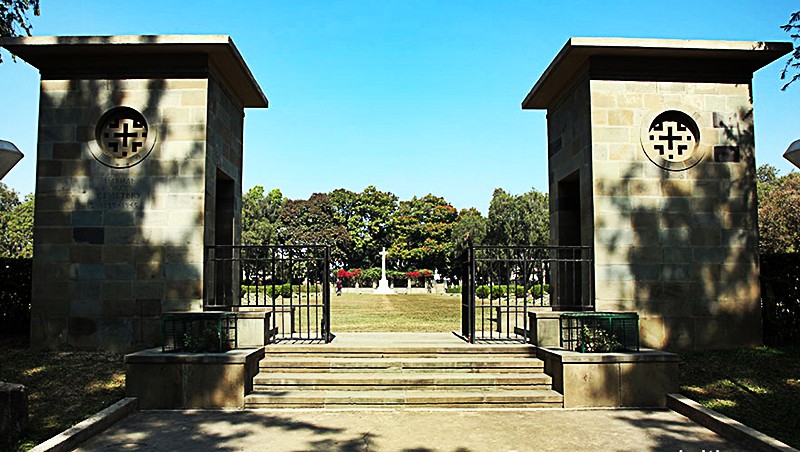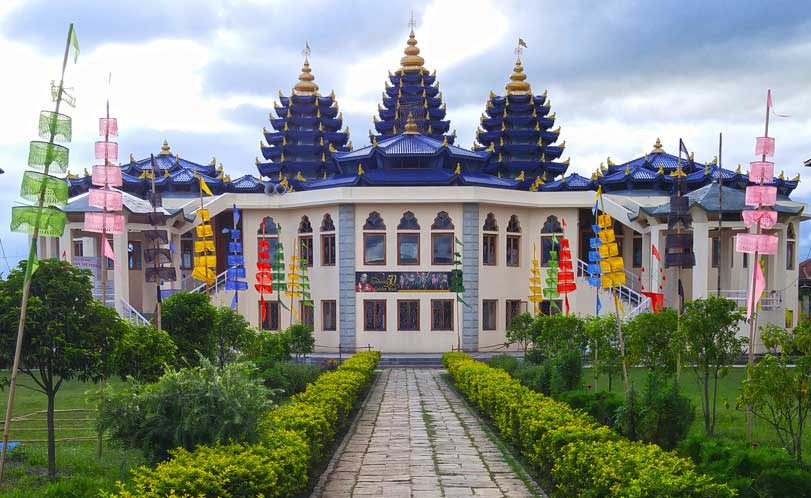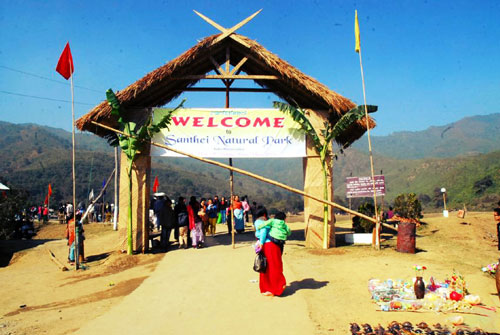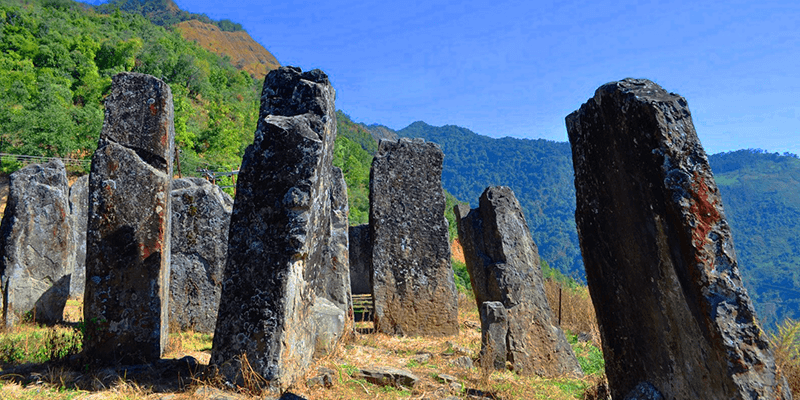Travel is a carousel of unfamiliar and exciting things and Manipur fits the brief perfectly. Its capital, Imphal, is a flat valley surrounded by hills that extend into Myanmar. Of the many places to visit in Manipur, the unassuming city houses, the expansive and historic Kangla area, the Imphal War cemetery of WWII and the Indo Japanese Peace Memorial at Red Hill serve as its major attractions.
The scenery changes dramatically once you drive out of Imphal. Dense exhilarating green hills run into each other at every bend of the road. There are a plethora of options to pursue. You can wander in the ancient village of Andro in the gorgeous Senthi Natural Park, do boating in the unique Loktak Lake – the lake of floating islands, visit the mystical monoliths in the spectacular mountain village of Willong Khullen, visit the INA War Museum in Moirang or you can just spend the evening at the famous Rita Café in Imphal with live Manipuri music at your disposal.
1. The Unique ‘Phumdis’ of Loktak Lake, Bishnupur

The villagers are warm and simple. You would not need to haggle with them for buying souvenirs. You can be pretty sure that they are asking for a reasonable rate. The largest freshwater lake in North East India, Loktak Lake is spread across an area of 280 sq. km. Situated in Bishnupur district, it is considered to be the lifeline of the Manipuris. With more than 200 species of aquatic plants, 100 species of birds and 400 species of animals, it’s an ecosystem in itself. Due to its varied flora and fauna, it has been given the tag of “Wetland of International Importance” by Ramsar conservation.
There are plenty of boating options in Loktak Lake and it is very popular among visitors. The Sendra Park and Resort on an elevated large Phumdi is the only accommodation option overlooking the Loktak Lake. To have the best view of the Phumdis, it is advisable to visit the place during summers when water levels are low.
2. The War Cemetery, Imphal


‘There name liveth for evermore’ – says an inscription at the Imphal War Memorial. This place is a grim reminder of the brutal Japanese offensive on March 1944. The protection of Imphal was crucial to the defence of India. Surrounded by the enemy from almost all sides, the Indo-British army fought valiantly for two months and stalled the Japanese aggression.
More than 1600 burials of brave young soldiers (mostly Indian and British aged between 19-30 years) lie here. The names, age and their regiments are embossed on marble slabs placed aesthetically in several horizontal rows amidst a lush green landscape.
3. Iskcon Temple, Imphal

Lunglei means ‘The Bridge Of Rocks’. Set amidst sprawling gardens, the Tibetan inspired temple architecture is unique and quite unlike other ISKCON temples across the country. The interior is tastefully designed with a dome-shaped roof replete with various paintings and images of Lord Krishna.
4. The Indo-Japanese Peace Memorial, Maibam

Famously called the Battle of Red Hill, this small mound was the farthest place till which Japanese Army and the Azad Hind Fauj (AHF) could reach in 1944. Ironically, after the first battle of Independence (1857) where Indians fought with each other (sepoy uprising), this is the last battle before Independence where a similar thing happened.
It was also for the first time an Indian force (British Indian Army) resisted a foreign invasion successfully. Heavy casualties occurred on the aggressor. Out of the estimated 500 soldiers who attacked Red Hill, only 40 survived. It is said that even many years after the war, bones of dead soldiers could be seen during the monsoons when the soil washed away.
The Japanese Government with its persistent efforts and with the help of the then Governor of Manipur – Mr Chintamani Panigrahi managed to get a plot of 5000 sq. meters to commemorate the brave soldiers of either side. Located on the Tiddim Road near the village of Maibam, they built three memorials on the site of Red Hill – signifying the war between Japan, India and Britain.
5. Santhei Natural Park, Andro


An hour’s drive from Imphal, it is the ideal location for a day trip. It is famous for its handcrafted and unique style of pottery, tribal dolls, animal figurines and wood carvings.
Locals usually visit the Senthei Natural Park (adjacent to the village) as a popular picnic spot. Characterized by a lush green landscape, neat pathways, a sparkling lake and resplendently bright flower beds, it is an ideal place to unwind. Based at the foothills of the Nongmaiching range of Manipur, the place offers a beautiful panorama of the surrounding hills.
6. Kangla, Imphal

It was the royal seat of the erstwhile capital of Manipur. The Ningthouja dynasty ruled the state from 33 A.D until 1891 when the British Empire took over. Opened to the public only in 2004, the 238 acre of Kangla consists of the ancestral abode of the ruling clan, their burial places, temples, shrines and certain megalithic structures spread across its territory.
The Kangla region has a cult status for the Manipuri people as all relics, imprints and traces left behind by the history of Manipur originate from here. Govindajee Temple is inside the remaining fortified wall. Its array of pillars is a hallmark of the venerable structure.
7. INA War Museum, Moirang

On the way from Imphal to Loktak Lake, it will be worthwhile to visit the INA War Museum in Moirang.
It has several war exhibits and battle paraphernalia. It glorifies the INA struggle during World War II and its efforts to gain independence from the British. Photography is strictly prohibited within the premises.
A large statue of Netaji Subhas Chandra Bose stands at the entrance and symbolizes his efforts in leading the INA.
This place is of immense historical significance as for the first time the Indian Tricolor Flag was hoisted on 14th April 1944 when the INA along with the Japanese forces captured Moirang in their quest of Manipur.
8. Mystical Monoliths, Willong Khullen


Willong Khullen is a small village on the border of Manipur and Nagaland. Just at the entrance of this village lie rows of vertical stone slabs in various shapes and sizes surrounded by barbed wires. These structures have no history or significance of their existence.
Many of the villagers considered them sacred and regard them as holy spirits. A few old villagers are also of the view that these were built in honour of the fallen heroes of war in ancient times. It is said that it is impossible to count the monoliths due to their unusual positioning. There is always the chance of repetition. However, few unconfirmed reports estimate the number at 135.
9. Loukoipat Ecological Park, Bishnupur

Located between Imphal and Bishnupur is a hidden slice of heaven. The Loukoipat Ecological Park doesn’t receive many tourists and thus is bereft of commercial influence and offers untouched natural surroundings. Walk through the forest paths, boat in the calm waters of the small lake and watch the vast expanse of lotus plants which covers a third of the lake.





